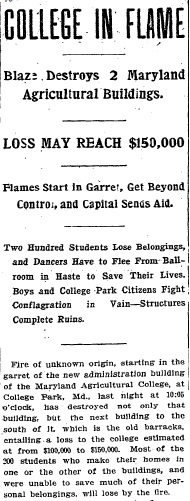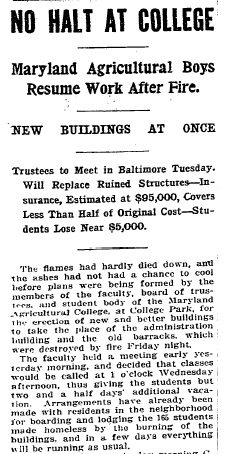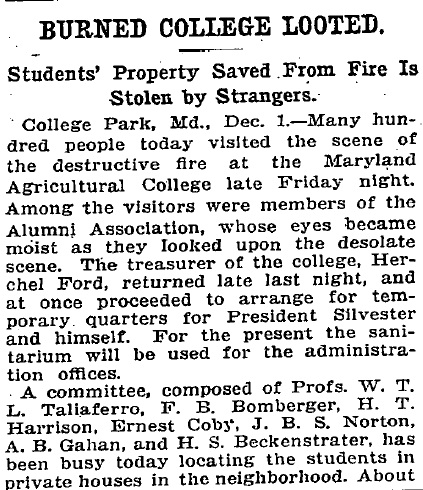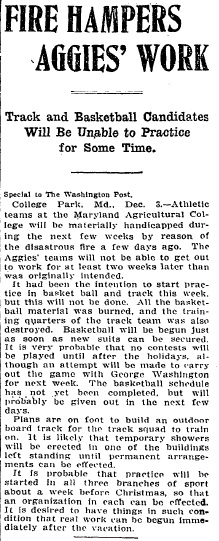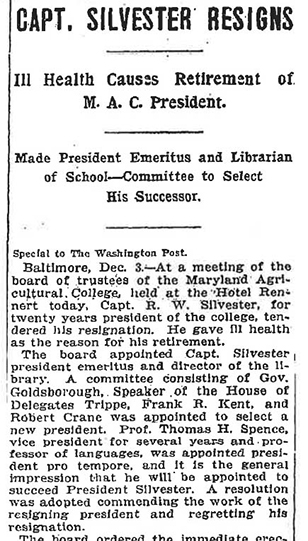Local Press
The Washington Post
Click a thumbnail image to read the full transcript of each article.
COLLEGE IN FLAME
Blaze Destroys 2 Maryland Agricultural Buildings.
LOSS MAY REACH $150,000
Flames Start in Garret, Get Beyond Control, and Capital Sends Aid.
Two Hundred Students Lose Belongings, and Dancers Have to Flee From Ballroom in Haste to Save Their Lives. Boys and College Park Citizens Fight Conflagration in Vain — Structures Complete Ruins.
Fire of unknown origins, starting in the garret of the new administration building of the Maryland Agricultural College, at College Park, Md., last night at 10:05 o'clock, has destroyed not only that building, but the next building to the south of it, which is the old barracks, entailing a loss to the college estimated at from $100,000 to $150,000. Most of the 200 students who make their homes in one or the other of the buildings, and were unable to save much of their personal belongings, will lose by the fire.
At 3 o'clock this morning the fire was still burning, with no apparent danger of spreading to the other buildings. It is confined to the structure in which it started and that adjoining it.
The blaze was discovered by some of the young men of the college as they came through the dining hall of the administration building to enter the main hall, in which the students remaining at the college for Thanksgiving were having their annual subscription dance.
Dancers Rush to Escape.
When the fire was discovered it had gained considerable headway, and after the alarm was sounded there was a frantic rush by the 40 couples who were dancing to get out of the burning building. Pretty girls, in their evening finery, were compelled to rush into the cold night with nothing but their evening dresses to protect them from the sharp southwest wind which swept across the campus and helped to fan the flames.
Students, after the girls were safely out of the administration building, organized themselves into a volunteer fire department, and every effort was made by the people of College Park to save the flame-encircled building. It was soon seen, however, that the facilities at the college and in College Park were not sufficient to cope with the situation, and a hurry-up call was sent to the fire department at Hyattsville, Md., and Washington. The Hyattsville company arrived in a short time, and the combined forces fought desperately to save the new administration building. Fanned by a stiff wind the flames swept down the quadrangle, on which is located five of the college buildings, and in about 50 minutes after the fire was discovered, the old barracks, which was the original building of the college, was in flames.
Chemistry Building Threatened.
Desperately the firemen of College Park, the students and the firemen of Hyattsville fought to stay the course of the flames, but for a time it looked as though their efforts would be in vain. For a while it looked as though the chemistry building, just south of the old barracks, would be destroyed. This building was kept well soaked with water.
While the firemen were seeking to confine the blaze to the two doomed buildings, two companies from the Washington fire department arrived, but too late to save either of the buildings, which were completely destroyed, with a large portion of the contents of the administration building. The Washington companies concentrated their efforts to save the two buildings at the other side of the quadrangle, the mechanical engineering building and the science building. Water was constantly played upon these buildings, and also the gymnasium, which stands at the south corner of the quadrangle.
Walls Cave In.
Shortly after 11 o'clock the walls of the new administration building caved in, but the firemen managed to get away before anyone was hurt. The walls of the old barracks fell in shortly before 12 o'clock, completing the ruin of that building. On account of the dance practically every one of the 40 young men remaining at the college during the Thanksgiving vacation was up and at the new administration building, so that every one of them escaped when the first alarm was sounded.
The campus, beyond the quadrangle, is filled with furniture taken from the old barracks, and some of that which was rescued from the administration building. A large crowd gathered to watch the progress of the fire, and at times got in the way of the men who were fighting the flames.
Women Lose Wraps.
Very few of the young women who were attending the dance saved their cloaks or hats, and the coats and hats of the students were also lost.
The exact cause of the fire is not known, but it is believed to have been caused by the crossing of electric wires in the top of the administration building, according to statements made last night by officials of the college.
The fire removes from the campus of the college the original building, which formed the nucleus around which has been erected the magnificent set of buildings which comprise the physical outline of the college. The building was erected in 1858 at a cost of about $300,000. The other building destroyed, the new administration building, was erected in 1905 at a cost of $60,000.
The other buildings in the quadrangle, except the engineering building, were erected prior to the construction of the administration building. The mechanical engineering building was erected two years after the administration building.
The college receives an annual appropriation of $9,000 from the State of Maryland.
Temporary Quarters for Students.
Temporary quarters for the 200 students, all of whom were housed in the two destroyed buildings, will be established in the music hall and other buildings.
Last night the people of College Park opened their homes to the 40 young men who lived in the burned structures.
While no official statement could be ascertained as to the future plans for the college, it was stated that undoubtedly the State would, at the earliest possible date, make an appropriation for a new administration building.
Considerable complaint was made last night of what was termed the inadequate facilities for fighting a fire of such size. If formal complaint is made as to this matter there will undoubtedly be an investigation by a committee of the Maryland legislature.
The fire will not prevent the resumption of study at the college Monday morning, as it is expected that some of the other buildings can be used.
Clarence B. King, president of the Washington Railway and Electric Company, sent two special trolley cars to the scene of the fire to convey the Washington guests at the dance to the city. Two policemen went with the cars. More policemen volunteered for duty at the fire, but they were not needed.
NO HALT AT COLLEGE
Maryland Agricultural Boys Resume Work After Fire.
NEW BUILDINGS AT ONCE
Trustees to Meet in Baltimore Tuesday. Will Replace Ruined Structures — Insurance, Estimated at $95,000, Covers Less Than Half of Original Cost — Students Lose Near $5,000.
The flames had hardly died down, and the ashes had not had a chance to cool before plans were being formed by the members of the faculty, board of trustees, and student body of the Maryland Agricultural College at College Park, for the erection of new and better buildings to take the place of the administration building and the old barracks, which were destroyed by fire Friday night.
The faculty held a meeting early yesterday morning, and decided that classes would be called at 1 o'clock Wednesday afternoon, thus giving the students but two and a half days' additional vacation. Arrangements have already been made with residents in the neighborhood for boarding and lodging the 165 students made homeless by the burning of the buildings and in a few days everything will be running as usual.
At an early hour yesterday morning C.H. Stavely of Laurel, Md., chairman of the executive committee of the board of trustees, was at the scene of the fire, and he was soon joined by John Hubert, president of the second branch of the Baltimore city council and chairman of the building committee of the college. A conference was held, and the faculty of the institution were authorized to resume work at once. Gov. P.L. Goldsborough, president ex officio of the college, has called a special meeting of the board of trustees to meet at the Rennert Hotel in Baltimore next Tuesday at 11 o'clock, and at that time steps will be taken for the immediate rebuilding of the ruined structures.
Only two lecture rooms, those used for the classes in mathematics and languages, were destroyed. Two spare laboratories are being pressed into service to supply the deficiency, and will be in readiness for the students Wednesday afternoon. The students are profoundly grieved and the college spirit was well displayed not only in the unequal fight they made against the fire, but in remaining around the institution during the fire and after it was put out. This is receiving favorable comment from the residents of the neighborhood who are much pleased with the attitude of the boys.
Insurance Less Than Half.
After the safe cools off it will be opened and the exact amount for which the buildings and their contents were insured will then be known. It is thought by the members of the faculty that the insurance will amount to approximately $95,000 all told, which is less than half the cost of the buildings. It develops that there was some insurance on the effects of the students who occupied the buildings, which is very gratifying to the faculty. A rough estimate of the loss sustained by the 165 students who lived in the burned buildings is fixed at $30 each, making a total of nearly $5,000.
Great credit is given the members of the Hyattsville fire department for their prompt response to the appeal for aid made by Vice President Thomas H. Spence, who, during the illness of Capt. R.W. Silvester, is acting president of the school, and for the manner in which they fought the flames. The prompt action taken by them in all probability saved the five large laboratories and shops which constitute the educational buildings of the college. The first response of Fire Chief Wagner, of this city, who came at once to the scene and ordered two engines from the city, sent at once by rail, also received favorable comment, but when the engines arrived it was too late for them to be of any use, as the buildings were practically in ruins.
That there is enthusiasm, latent to be sure, but none the less forceful, on the part of the faculty and student bodies, is shown by the fact that both believe that from the ashes of this the first agricultural college in America, will arise a greater and larger institution than that which even now is the largest college for undergraduate students in Maryland.
BURNED COLLEGE LOOTED.
Students' Property Saved From Fire Is Stolen by Strangers.
College Park, Md., Dec. 1. — Many hundred people today visited the scene of the destructive fire at the Maryland Agricultural College late Friday night. Among the visitors were members of the Alumni Association, whose eyes became moist as they looked upon the desolate scene. The treasurer of the college, Herschel Ford, returned late last night, and at once proceeded to arrange for temporary quarters for President Silvester and himself. For the present the sanitarium will be used for the administration offices.
A committee, composed of Profs. W.T.L. Taliaferro, F.B. Bomberger, H.T. Harrison, Ernest Coby, J.B.S. Norton, A.B. Gahan, and H.S. Beckenstrater, has been busy today locating the students in private houses in the neighborhood. About 50 of the students will be accommodated in Hyattsville.
A distressing result of the conflagration is the discovery that considerable looting took place during or immediately after the fire. The officials of the college state that strangers attracted to the fire made away with the articles. These goods, the property of the students, which had been carried out, for the most part, were taken from obscure parts of the premises not under patrol.
FIRE HAMPERS AGGIES' WORK
Track and Basketball Candidates Will Be Unable to Practice for Some Time.
Special to The Washington Post.
College Park, Md., Dec. 3. — Athletic teams at the Maryland Agricultural College will be materially handicapped during the next few weeks by reason of the disastrous fire a few days ago. The Aggies' teams will not be able to get out to work for at least two weeks later than was originally intended.
It had been the intention to start practice in basket ball and track this week, but this will not be done. All the basket-ball material was burned, and the training quarters of the track team was also destroyed. Basketball will be begun just as soon as new suits can be secured. It is very probable that no contests will be played until after the holidays, although an attempt will be made to carry out the game with George Washington for next week. The basketball schedule has not yet been completed, but will probably be given out in the next few days.
Plans are on foot to build an outdoor board track for the track squad to train on. It is likely that temporary showers will be erected in one of the buildings left standing until permanent arrangements can be effected.
It is probable that practice will be started in all three branches of sport about a week before Christmas, so that an organization in each can be effected. It is desired to have things in such condition that real work can be begun immediately after the vacation.
CAPT. SILVESTER RESIGNS
Ill Health Causes Retirement of M.A.C. President.
Made President Emeritus and Librarian of School — Committee to Select His Successor.
Special to The Washington Post.
Baltimore, Dec. 3 — At a meeting of the board of trustees of the Maryland Agricultural College, held at the Hotel Rennert today, Capt. R. W. Silvester, for twenty years president of the college, tendered his resignation. He gave ill health as the reason for his retirement.
The board appointed Capt. Silvester president emeritus and director of the library. A committee consisting of Gov. Goldsborough, Speaker of the House of Delegates Trippe, Frank R. Kent, and Robert Crane was appointed to select a new president. Prof. Thomas H. Spence, vice president for several years and professor of languages, was appointed president pro tempore, and it is the general impression that he will be appointed to succeed President Silvester. A resolution was adopted commending the work of the resigning president and regretting his resignation.
The board ordered the immediate erection of temporary quarters for the students and work on these will be commenced at once. It is also known that the board will proceed with the erection of permanent buildings to replace those destroyed by fire, relying on appropriations to be made at the session of the legislature in 1914. It was reported that every student except two had reported for the resuming of studies tomorrow. Gov. Goldsborough presided at the meeting.

